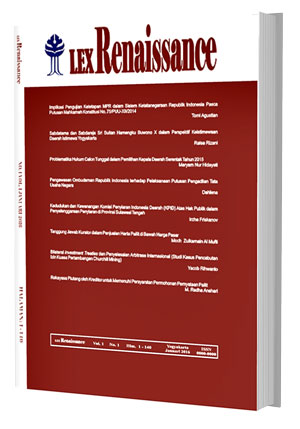Main Article Content
Abstract
Keywords
Article Details
Authors who publish with this journal agree to the following terms:
a. Authors retain copyright and grant the journal right of first publication with the work simultaneously licensed under a Creative Commons Attribution License that allows others to share the work with an acknowledgement of the work's authorship and initial publication in this journal.
b. Authors are able to enter into separate, additional contractual arrangements for the non-exclusive distribution of the journal's published version of the work (e.g., post it to an institutional repository or publish it in a book), with an acknowledgement of its initial publication in this journal.
c. Authors are permitted and encouraged to post their work online (e.g., in institutional repositories or on their website) prior to and during the submission process, as it can lead to productive exchanges, as well as earlier and greater citation of published work (See The Effect of Open Access).References
- Buku
- Adjie, Habib, Sanksi Perdata dan Administrasi Terhadap Notaris Sebagai Pejabat Publik, Refika Aditama, Bandung, 2008.
- J. Satrio, Hukum Perikatan, Perikatan Yang Lahir Dari Perjanjian, Citra Aditya Bakti, Bandung, 1995.
- J.Satrio, Hukum Perjanjian, Citra Aditya Bakti, Bandung, 1992.
- Kansil, C.S.T. dan Christine S.T.Kansil, Pokok-Pokok Etika Profesi Hukum, Pradnya Paramita, Jakarta, 1997.
- Kie, Tan Thong, Studi Notariat Beberapa Mata Pelajaran Dan Serba Serbi Praktek Notaris, PT. Ichtiar Baru Van Hoeve, Jakarta, 1994.
- Mertokusumo, Sudikno, Hukum Acara Perdata Indonesia, Liberty, Yogyakarta, 1993.
- Rosjidi Ranggawidjaya, Pengantar Ilmu Perundang-Undangan Indonesia, Mandar Maju, Bandung, 1998.
- Shubhan, Hadi, Hukum Kepailitan, Prinsip, Norma, dan Praktik di Peradilan, Kencana Prenada Media Group, Jakarta, 2008.
- Sjahdeini, Sutan Remy, Hukum Kepailitan: Memahami Undang-Undang Kepailitan No.37 Tahun 2004 Tentang Kepailitan, PT Pustaka Utama Grafiti, Jakarta, 2002.
- Jurnal
- Putri Pertiwi Santoso, “Analisis Yuridis Terhadap Pengangkatan Kembali Notaris Yang Telah Dinyatakan Pailit Oleh Pengadilan”, Jurnal, Magister Kenotariatan Fakultas Hukum Universitas Brawijaya Malang, Malang, 2015.
- Junita Sari Ujung, “Independensi Kurator Dalam Pengurusan dan Pemberesan Harta Pailit”, Magister Kenotariatan Fakultas Hukum Universitas Indonesia Depok, Jurnal, Depok, 2008.
- Peraturan Perundang-Undangan
- Kitab Undang-Undang Hukum Perdata
- Undang-Undang Nomor 37 tahun 2004 tentang Kepailitan dan Penundaan Kewajiban Pembayaran Utang.
- Kode Etik Notaris Ikatan Notaris Indonesia (I.N.I) Undang-Undang Nomor 2 Tahun 2014 tentang Jabatan Notaris
References
Buku
Adjie, Habib, Sanksi Perdata dan Administrasi Terhadap Notaris Sebagai Pejabat Publik, Refika Aditama, Bandung, 2008.
J. Satrio, Hukum Perikatan, Perikatan Yang Lahir Dari Perjanjian, Citra Aditya Bakti, Bandung, 1995.
J.Satrio, Hukum Perjanjian, Citra Aditya Bakti, Bandung, 1992.
Kansil, C.S.T. dan Christine S.T.Kansil, Pokok-Pokok Etika Profesi Hukum, Pradnya Paramita, Jakarta, 1997.
Kie, Tan Thong, Studi Notariat Beberapa Mata Pelajaran Dan Serba Serbi Praktek Notaris, PT. Ichtiar Baru Van Hoeve, Jakarta, 1994.
Mertokusumo, Sudikno, Hukum Acara Perdata Indonesia, Liberty, Yogyakarta, 1993.
Rosjidi Ranggawidjaya, Pengantar Ilmu Perundang-Undangan Indonesia, Mandar Maju, Bandung, 1998.
Shubhan, Hadi, Hukum Kepailitan, Prinsip, Norma, dan Praktik di Peradilan, Kencana Prenada Media Group, Jakarta, 2008.
Sjahdeini, Sutan Remy, Hukum Kepailitan: Memahami Undang-Undang Kepailitan No.37 Tahun 2004 Tentang Kepailitan, PT Pustaka Utama Grafiti, Jakarta, 2002.
Jurnal
Putri Pertiwi Santoso, “Analisis Yuridis Terhadap Pengangkatan Kembali Notaris Yang Telah Dinyatakan Pailit Oleh Pengadilan”, Jurnal, Magister Kenotariatan Fakultas Hukum Universitas Brawijaya Malang, Malang, 2015.
Junita Sari Ujung, “Independensi Kurator Dalam Pengurusan dan Pemberesan Harta Pailit”, Magister Kenotariatan Fakultas Hukum Universitas Indonesia Depok, Jurnal, Depok, 2008.
Peraturan Perundang-Undangan
Kitab Undang-Undang Hukum Perdata
Undang-Undang Nomor 37 tahun 2004 tentang Kepailitan dan Penundaan Kewajiban Pembayaran Utang.
Kode Etik Notaris Ikatan Notaris Indonesia (I.N.I) Undang-Undang Nomor 2 Tahun 2014 tentang Jabatan Notaris




